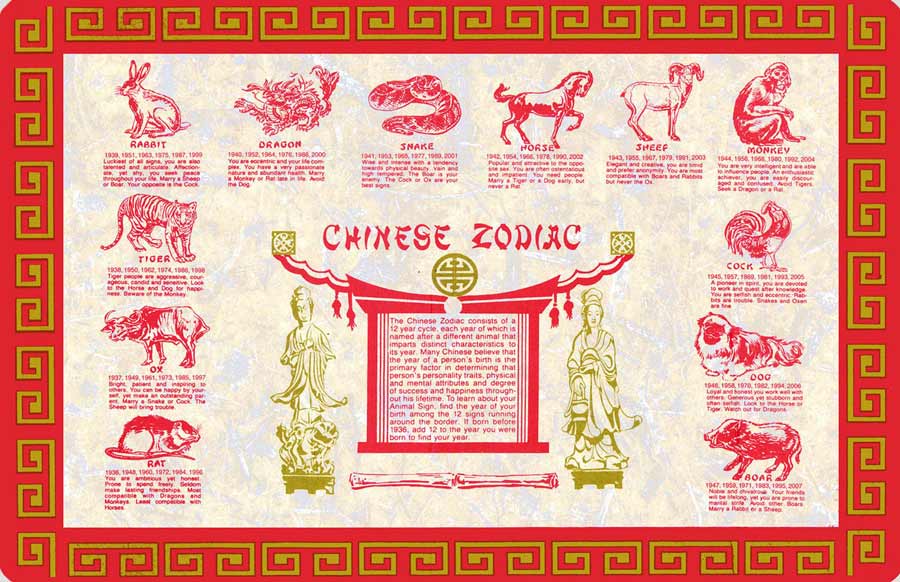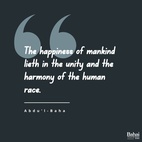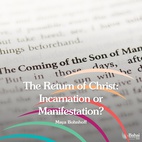The views expressed in our content reflect individual perspectives and do not represent the authoritative views of the Baha'i Faith.
Have you ever had dinner in a Chinese restaurant and looked at that paper placemat with the signs of the Chinese Zodiac? Typically, the illustrated placemat depicts the years of the Monkey, Rooster, Dog, Boar, Rat, Ox, Tiger, Rabbit, Dragon, Snake, Horse, and Sheep, with explanations of the characteristic personality traits associated with those born in each of these zodiacal years. Under each illustration, human birth years and generic, open-ended predictions correspond to each animal sign, associated with people born in the year of that animal.

In this series, we’ve talked about names associated with months, days of the month, weekdays and now years, all named in a Baha’i cycle of 19 years. There is no Baha’i counterpart to the Chinese Zodiac, but there are characteristics associated with the name of each year—angelic characteristics associated with the lofty attributes of God. This is not a criticism of the Chinese Zodiac, which is simply offered as a familiar analogy. The Chinese Zodiac may be edifying in its own way.
Let’s take the Baha’i year of “Bountiful,” the name of the 14th year in the Baha’i cycle of 19 years in the unique and “Wondrous” Badi Calendar. The Arabic word for“the Bountiful” is al-Wahhab (Persian: Vahhab), and has the numerical value of 14. (Each Arabic letter as a numeric value, in what is called the abjad system.) “Bountiful” is an attribute of God, meaning “one who gives generously” and is mentioned three times in the Quran (3:8; 38:9 & 35). In Islamic tradition, al-Wahhab (sometimes translated as “the Bestower”) is considered to be one of the “names which resolve to action.” Al-Ghazali explains “The Bestower,” in part, as follows:
A gift is a present free from recompense and interests. If gifts with this qualification are numerous, the one giving them is called a “bestower” and “generous” soul. But generosity and giving cannot authentically be conceived of except from God the most high! For He is one who gives to everyone what he needs, neither for recompense nor out of interest, either now or later. … Counsel: Generosity or giving tout court are inconceivable on the part of a human being. … But the one who sacrifices all that he owns, even his life, for the sake of God alone — great and glorious, not to arrive at the comfort of Paradise or to avoid the pain of Hell, or for an immediate or future gain such as would be accorded on being among the gains proper to man, such a one is worthy of being named giver and generous. … We would say: his gain is God, the Most High: His acceptance, as well as meeting Him and reaching Him. And that is the happiness which man acquires by his free actions, and in comparison to it, every other gain is to be disdained. – al-Ghazali, The Ninety-Nine Beautiful Names of God, translated by David B. Burrell and Nahzy H. Danher, pp. 73–75.
Similarly Baha’u’llah, in the “Tablet of the World,” counsels:
Aid them, O Lord, to acquire such virtues as will exalt their stations among the peoples of the world. Verily Thou art the Powerful, the Mighty, the Most Generous [al-Wahhab]. – Tablets of Baha’u’llah, p. 92.
A similar attribute of God and human virtue is “Generosity” (Jad), the eighth Baha’i year in a cycle of 19 years, which can be expressed as a sterling human quality and a praiseworthy deed:
O children of dust! Tell the rich of the midnight sighing of the poor, lest heedlessness lead them into the path of destruction, and deprive them of the Tree of Wealth. To give and to be generous are attributes of Mine; well is it with him that adorneth himself with My virtues. – Baha’u’llah, The Hidden Words, p. 39.
Here, notice how Baha’u’llah draws a dynamic connection between generosity (“To give and to be generous are attributes of Mine”) and the virtuous (“him that adorneth himself with My virtues”). While Baha’u’llah speaks of the “rich,” the wealthy are not the only ones who can live up to Baha’u’llah’s moral imperative, “to give and to be generous.” Those of modest means, out of their own magnanimity, can bestow whatever resources they have for the benefit of others, too.
In 1926, Shoghi Effendi, the Guardian of the Baha’i Faith, emphasized the dynamic connection between giving to others out of the bounty bestowed by God:
We must be like the fountain or spring that is continually emptying itself of all that it has and is continually being refilled from an invisible source. To be continually giving out for the good of our fellows undeterred by fear of poverty and reliant on the unfailing bounty of the Source of all wealth and all good—this is the secret of right living. – Shoghi Effendi, Directives from the Guardian, p. 32.
Here, “right living” involves generously doing right by others. In drawing upon the spiritual energies that the attributes of God offer as a spiritual resource, we can, each and all, achieve our spiritual potential by doing some real good in this mortal realm—in other words, “inspiring all to characterize themselves with the characteristics of God” – Abdu’l-Baha, Selections From the Writings of Abdu’l-Baha, p. 93.
Here, “inspiring all to characterize themselves with the characteristics of God” recalls the Islamic mystic, al-Shadhili, who wrote that mystics should strive to be “characterized by the characteristics of God, abiding closely by the commands of God, relinquishing the defense of one’s self from shame before God and holding to the practice of spiritual converse by truly abiding with God” – Ibn al-Ṣabbagh, TheThe Mystical Teachings of al-Shadhili, translated by Elmer H. Douglas, p. 132.
Abdu’l-Baha put this very same concept another way:
The new birth is realized in this world when we become characterized with the characteristics of God, when His name and attributes become our name and attributes. – Abdul Baha: Notes taken at Acca about 1900, Star of the West, Vol. 14, no. 1, April 1923, p. 10.

















Comments
Sign in or create an account
Continue with Facebookor